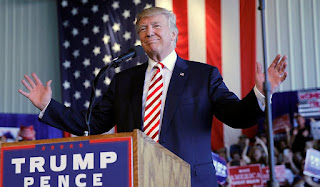 |
| Donald J. Trump |
2017 unfolded with much emphasis based on nationalism especially in the wake of 2016 revealing the result of Brexit and the possible impact a final exit of the British would have on the European Union and regionalism. Refugees continue to flow, tensions remain high, uncertainty reigns supreme and violence has not dissipated. The news out of America dominates the media as the world sits livid, helplessly watching that which is unfolding in a country which was said to have led the free-world, policed the world at large and been the only super power for the last couple of decades. Yet amidst the debate and drama over the product of the polls, the process escapes unscathed.
The American system is flawed. It is not everything it is held out to be. If a contender with two to three million votes more loses owing to the electoral college opting otherwise, hasn't the system failed? Is this how the will of the people is expressed? The last time it happened in 2000, Al Gore lost out on the White House, despite winning the popular vote. It was the only time since 1888, when Benjamin Harrison won over Grover Cleveland, that the winner of the popular vote lost the election. Earlier occasions are attributed to 1876 and 1824. In 2016, we had a repetition.
When the electoral college was instituted it was done to protect the rights of people across the country. To ensure that those on one coast or one region didn't have the opportunity to 'manipulate' or 'control' power over other regions. In a democracy, everyone is expected to have the opportunity to voice their opinion irrespective of gender, colour, creed or religious belief. How then do we comprehend the American narrative where restrictions are superimposed and barriers installed, limiting the rights of people to express their opinion.
What of those who choose to keep away from polling booths? In 2016, 40% of eligible voters didn't exercise their franchise. While the lowest figure in this century, American polls have seen 54 % staying away in 2000, 60% in 2004, it climbed to 62% in 2008 and 57% in 2012. The revelation of the Brexit vote was alarming not owing to the number who wanted to remain or leave the European Union, but the 28% of British voters who chose to remain silent. The apathy with which citizens view their civic duties has always been a concern. We want our rights but neglect our responsibilities.
What then is this form of populism? Is it the response to the neoliberal era or an excessive dependence on a system that has failed over and over again, or is it a hybrid of the two? While the liberal ideology prospered during the Obama years, and is in part what led to the Trump candidacy, shouldn't we critically examine the American electoral system, the process in this case, instead of focusing on Trump, the product? While his actions at present warrant concern, someone far more radical and damaging could occupy the seat next and nothing is being done about it.
- Editorial
